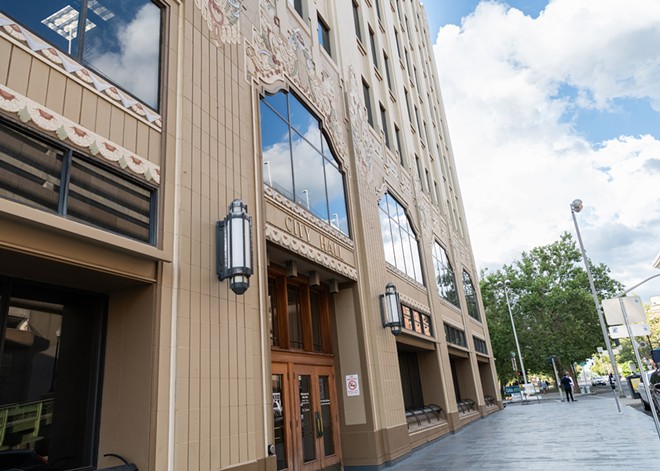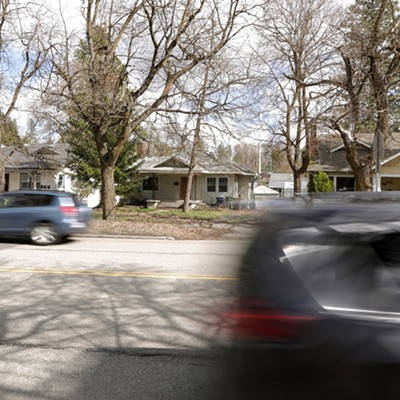On Monday, Spokane City Council members passed Spokane's annual list of priorities for the upcoming 2024 state legislative session.
The list reflects some of the greatest challenges facing the city, including homelessness, wildfires, public safety, anti-LGBTQ+ hate and child care shortages. It also asks the state to help fund parks and recreational space.
The process of choosing the priorities is driven by the City Council's three-person legislative committee and staff from the City Council and mayoral administration, says Erik Poulsen, the City Council's manager of intergovernmental affairs.
The priority list is a bit of a balancing act. The city has a lot of needs, but the state only has so much money, and this year's legislative session is a "short" 60-day session, which means money and time will be limited.
"I think we're strategic," says Council member Zack Zappone, who sits on the City Council's legislative team. "We don't want to ask for too much and know that it's not going to happen."
Council member Michael Cathcart voted against approving the list, as he's consistently done in the past. He says he's concerned about transparency because the three council members assigned to the legislative team also create secondary priority lists that don't come to the full City Council for a vote. Regardless, Cathcart says he supports most of the items approved Monday.
State Senate Majority Leader Andy Billig, a Democrat whose district covers much of Spokane, says it's unlikely that every item on the city's list will happen, but that the overall list has a good mix of realistic and ambitious requests.
STRONGER HATE CRIME LAWS
In October, Spokane's rainbow crosswalks were repeatedly targeted with paint and graffiti. But despite what appears to be a clear anti-LGBTQ+ motivation, the vandalism wasn't classified as a hate crime.
Billig says that's because Washington's current hate crime law only applies to private property — not public property.
"If somebody were to spray paint a swastika on City Hall, that would, under current law, not be able to be charged as a hate crime," Billig says.
Billig says Zappone brought the issue to him after the string of incidents this fall, and that he now plans to sponsor a bill to close the loophole during the upcoming session. He adds that he's consulted with nonpartisan experts who told him expanding the state's hate crime law to include hate-motivated vandalism to public property won't run afoul of the First Amendment.
The priority list passed on Monday also asks the state Legislature to create a hate-crime hotline in the State Attorney General's Office that would "connect victims with crisis intervention, information, and referrals to community service providers."
A Senate bill to create such a hotline failed to advance last year, but Billig is optimistic about its chances this year. Of all the requests on Spokane's 2024 list, Billig says the hate crime laws are probably the most likely to succeed because they don't involve funding requests or taxes.
TAXES FOR HOUSING, HOMELESSNESS
In 2001, Washington voters passed an initiative that prevents cities from raising property taxes by more than 1% per year. Zappone says the limit has "handicapped" Spokane, and he notes that the Association of Washington Cities is also pushing the state to raise the "arbitrary" limit from 1% to 3% this year.
"When inflation gets really bad we can't keep up," says Council member Jonathan Bingle, who also sits on the Council's legislative committee. "Whether or not I would vote for it would be another discussion, but I don't think it's out of bounds."
A Senate bill to raise the cap last year was met with opposition from a number of Republicans concerned about increasing the burden on taxpayers, and it failed to make it out of committee.
Billig says he isn't sure if the bill will pass this year.
"I think there's a chance, but all tax bills get a sort of extra level of scrutiny, so I don't think we can say for sure," Billig says. "But it's a reasonable step toward some additional local control."
Spokane is also asking the state to expand its real estate excise tax with a local option to "help fund affordable housing, behavioral health services for people experiencing homelessness, and provide seed money for a regional homeless authority."
A House bill to expand the state's tax on property sales and create a new real estate tax of 4% on property valued over $5 million failed to advance during last year's session, and it will likely be reconsidered this year. Billig says the revised bill has a lot of moving pieces, and that he needs more information.
FUND A NORTHEAST CHILD CARE CENTER
The city is asking the state for $2.5 million to build a child care center in northeast Spokane. The center would specifically cater to people who work weekends, swing shifts and other nontraditional hours that make traditional child care difficult.
Bingle is super excited about the proposal. He says the project has "some real legs" and support from a variety of stakeholders. The child care center is being spearheaded by the Northeast Community Center and the Northeast Public Development Authority.
"The trouble is that, because it's a short session, I don't know that we can get the money that we're asking for," Bingle says. "Our state representatives told us to put in the ask, and if nothing else, we can move it forward to the line for next year or something."
On Monday, Zappone added a last-minute item asking the state for $750,000 to improve Coeur d'Alene Park.
MONEY FOR PARKS AND TRAILS
The city is asking for $1 million to improve safety and install new play equipment, restrooms, and sports facilities at northeast Spokane's Minnehaha Park. The city expects that an additional $8.5 million for upgrades to the park will come from the city's coming parks levy (if voters approve), with an additional $1 million to $1.5 million from a grant from the state's Recreation and Conservation office.Bingle, who represents northeast Spokane's District 1, says he's especially excited about the upgrades and efforts to make Minnehaha into a major regional recreation area.
The city is also asking the state for $1 million to help connect Spokane's Fish Lake Trail with the Columbia Plateau Trail, a 130-mile trail that runs through Eastern Washington to Pasco. The city has paved about 9 miles of the trail, but a 1-mile gap remains that will require a bridge to cross two active rail lines.
Billig says the short session means the state's capital budget is particularly constrained this year, and that the parks, child care center and other infrastructure projects on the city's priority list will likely be an uphill battle.
LATAH VALLEY FIRE STATION
Last summer's wildfires reignited longstanding concerns about a lack of permanent firefighting infrastructure in Spokane's Latah Valley neighborhood, which sits on the western outskirts of the city next to a wooded area that is difficult for emergency vehicles to reach.
The city is in the process of designing a permanent fire station for the neighborhood. In the priority list passed Monday, the city said "an additional $8 million is needed" to speed up construction.
Bingle says it makes sense for the state to chip in because firefighters at the new station will also be responding to calls outside city limits.
"It isn't just good for the city, it's also good for the region," Bingle says.
Bingle says the city isn't asking the state to cover the entire $8 million. He says that he's asked the city's finance department to do a study to see what percentage of the fire station will be serving the city versus the region as a whole and that the city will use that number to determine how much of the cost they'd like the state to cover.
Zappone says legislators have told him the fire station might be especially difficult, because fire stations are typically considered basic city operations, which the state doesn't usually fund.
Billig says the request might be a reach, but that he's reserving judgment until he gets more information.
"Maybe they know something I don't," Billig says. "Maybe there's some grant program for helping cities to build fire stations I'm not aware of." ♦

























